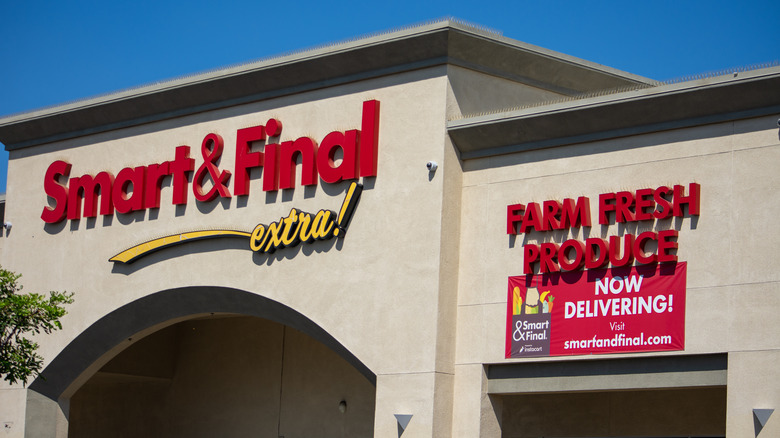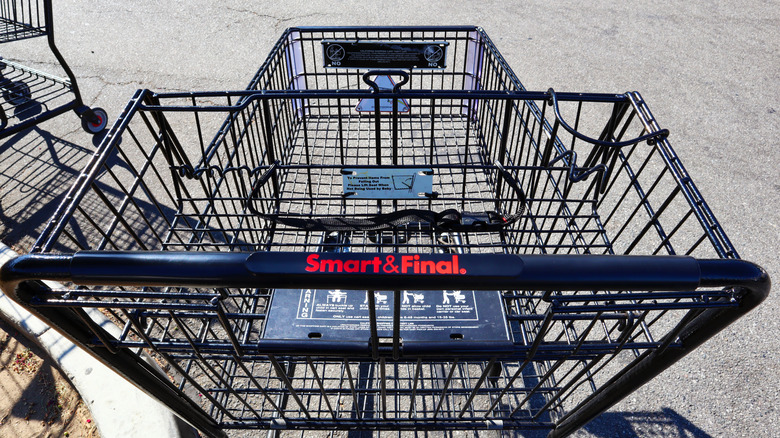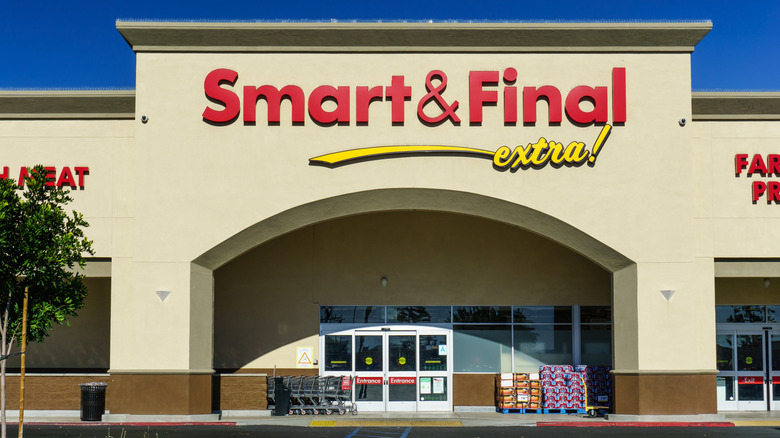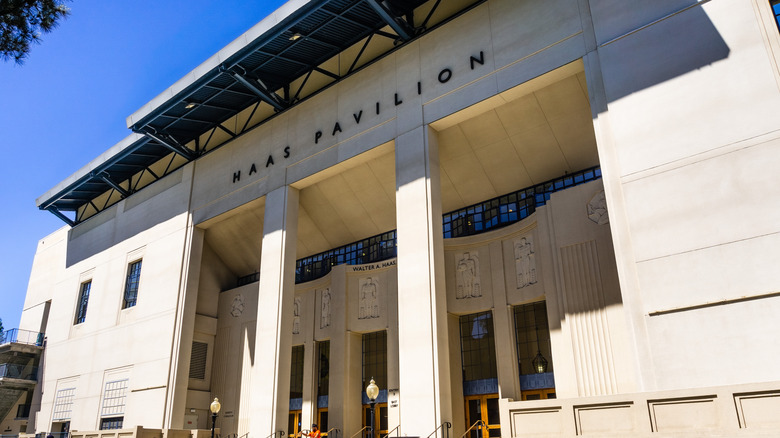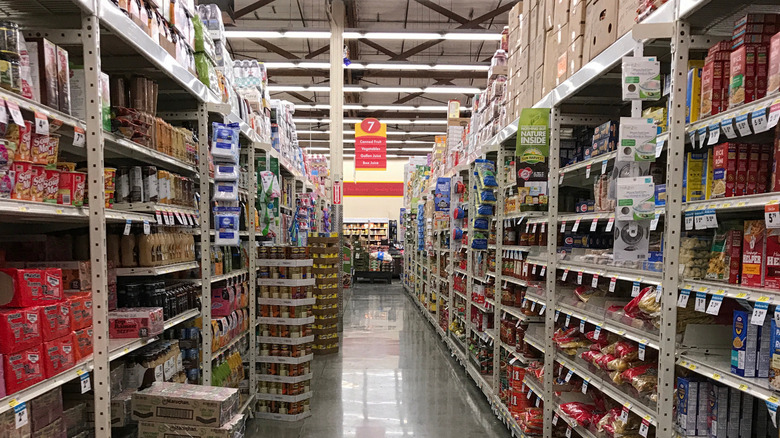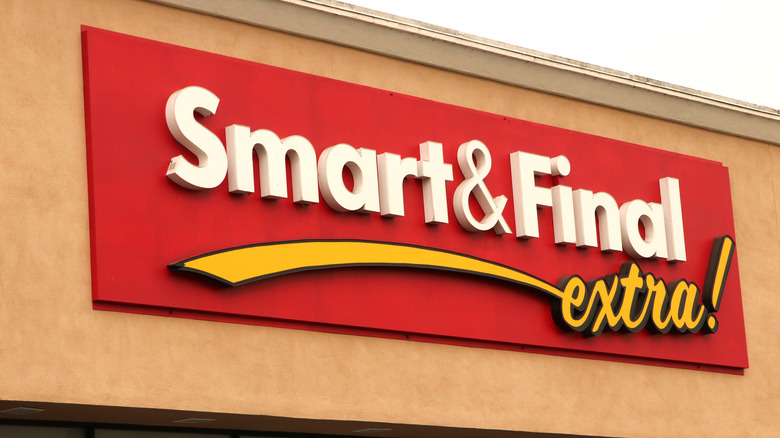The Untold Truth Of Smart & Final
If you're on the East Coast, you might have not heard of Smart & Final before. But across the West Coast, where it originated, the company is decently well-established. This California-based grocery chain has 254 stores across California, Arizona, and Nevada, according to Supermarket News.
Smart & Final has all you can ask for in a supermarket — carrying everything from eggs to milk to fruit snacks. And at 198 of its Smart & Final Extra! stores, you can get these items in bulk quantities. Smart & Final gets its products from a variety of different vendors and prides itself in offering, "more than 3,000 club-sized items alongside your daily grocery needs," according to its "About Us" page.
The company describes itself as "The Smaller, Faster Grocery Warehouse Store," which is listed in the bio section of its Twitter and Instagram accounts, and has a strong commitment to serving its communities. Though it is exclusively located on the West Coast as of now, Smart & Final's origin story is unlike any other, and it's worth learning a few facts about the popular chain.
Smart & Final invented the concept of "cash and carry"
Believe it or not, walking down the aisles at your local grocery store was not the norm in the period prior to the 20th century. Instead, a clerk would round up your groceries for you to collect afterward, according to the company's website.
Though this older concept is becoming more popular today, with grocery apps such as Instacart and 1520, we have to thank Smart & Final for pushing out this revolutionary concept. It's rather mind-blowing that you couldn't hand select the box of cereal you wanted before Smart & Final opened up.
One of the things Smart & Final prides itself most in is its accessibility and proximity to its customers' businesses. They first set up a cash and carry in Long Beach in 1923. By being closely located to its clientele, therefore sparing people the long travel to remote warehouses, the supermarket chain allowed its customers to shop for themselves, coining the new "cash and carry" concept. Thank you, Smart & Final, for implementing this modern shopping practice early on!
Smart & Final's name comes from its founders
Smart & Final is actually the name of the two company's founders! We admit — this might be a little hard to believe. The name fits its shopping concept perfectly, with it being the first "cash and carry" supermarket, after all.
However, Smart & Final's original founders were named J.S. "Jim" Smart and H.D. "Hildane" Final, thus resulting in the name Smart & Final Wholesale Grocers. Smart & Final was then acquired a few times after it was founded in 1914. It merged with Haas, Baruch & Co. in 1953, where it kept Smart & Final as its name. Then, it was acquired by Thriftimart, Inc, which helped it expand to 83 units, according to the company's website.
It wasn't until 1984 when Thriftimart, Inc. changed its name to Smart & Final Iris Corporation. We wish we could say that "the rest was history," but Smart & Final was bought and sold several times after that, reaching another breakthrough in 2008, when it started its Smart & Final Extra! stores.
Many stores have opened since that date, and we're excited to see where Smart & Final expands to next (hopefully the East Coast!).
One of its founding fathers is from an extremely influential family
Unlike other grocery chains, such as Publix and Trader Joe's, which come from more humble origins and were the products of one person, Smart & Final was a result of multiple collaborations. As mentioned before, the company Smart & Final merged with — Haas, Baruch & Co. — was created between business partners Herman Hellman, Jacob Haas, and Bernard Cohn, according to the company's 'History' page.
The company was created in 1871. As you can imagine, Los Angeles was scarcely settled at the time, and the company's main commodities were flour, brown sugar, and sheepherding supplies. The name was then modified to Haas, Baruch & Co. in 1889, and then began to sell products with its own private label, including canned tomato.
Abraham Haas, who was Jacob Haas's brother and co-owned the company at the time, then relocated to the Bay Area to create Haas Wholesale Grocers. Does that name sound familiar?
To answer that question — The Haas School of Business at the University of California, Berkeley was named in honor of Walter, Abraham Haas's son.
You do not need a club membership to shop at Smart & Final
Unlike other popular wholesale supermarkets, like Costco and Sam's Club, Smart & Final does not require a membership fee in order for you to shop there.
This makes it a great option for families who do not want to commit to a set annual fee, or if you are just in the vicinity of one and want to make a grocery stop. However, because it doesn't have a fixed membership rate, FindAnyAnswer.com describes its prices as, "... not as competitive as it was 20 years ago. It's hip now and has a price tag to go with."
However, not having a membership fee has actually been beneficial to the company, according to CEO Dave Hirz. Hirz told Progressive Grocer that, "We actually have more club-sized items than any of the club stores, which makes us a one-stop-shop for households as well as businesses and organizations."
And Smart & Final definitely has its loyal customers, per the Shelby Report, who continue to make the chain their ultimate destination for all their kitchen and household needs, even without a binding annual membership.
Smart & Final is heavily committed to community service
As a whole company, Smart & Final invests a lot in philanthropic efforts. Smart & Final takes a lot of pride in making an impact in the communities its stores are located in. According to a 2019 report by the company, Smart & Final donated $1.8 million to education, hunger relief, team sports & youth development, health and wellness, and disaster relief. Additionally, it had 1,800 volunteer hours for the year of 2019 alone, and frequently hosts events such as walks and cycling events for fundraising efforts.
In 2002, the supermarket chain also founded the Smart & Final Charitable Foundation, which has the mission of giving back to communities in California, Arizona, and Nevada (via Business Wire). Some of its key community partners include Feeding America and City of Hope, according to its website.
Furthermore, on the company's donation page, Smart & Final encourages any nonprofits that align with its pillars of focus to apply for donations.
